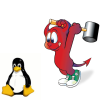|
The Greatest OS That (N)ever Was
Glyn Moody 2007.05.13. 08:09
 That is where the way goes now That is where the way goes now
where a new track leads
for more versatile singers
more abundant bards
among the youngsters rising
among the people growing.
- Kalevala 50:611-620
The Greatest OS That (N)ever Was
By Glyn Moody
Linus Torvalds and thousands of disparate hackers created Linux, perhaps the only alternative to Windows NT. It may be the greatest software story never completed.
Nor yet were you seen
neither seen nor heard
when this earth was made
when the sky was built...
- Kalevala 3:245-248
The Kalevala is an epic poem of some 23,000 lines. Written in Finnish, it forms a huge patchwork of fragments taken from an oral tradition evolving over thousands of years in the province of Karelia, a region now split between Finland and Russia. Its creation in the middle of the 19th century was instrumental in defining not only the Finnish language but the Finnish nation.
The hero of the Kalevala is the shaman Väinämöinen. Early in the poem he is challenged by his hotheaded rival Joukahainen to a duel of magic powers, expressed through secret chants. At the end of this one-sided contest, the upstart is defeated, and the hero triumphantly asserts his unanswerable superiority by noting that he, Väinämöinen, helped create the world.
While the Kalevala is the result of an expansive literary imagination, its origins resemble the real-world inception of what some consider to be the greatest masterpiece that the Internet has produced. Aided by thousands of dis-parate hackers - a "net.mind" of sorts - Linus (pronounced "LEE nus") Torvalds, a 27-year-old Finn, has also created a new world. That realm, Linux (pronounced "LINN-ooks"), is an operating system, the force that defines the digital domain of programs just as our own environment determines the characteristics of animal and plant life.
For most hackers, the goal is to create neat routines, tight chunks of code, or cool apps that earn the respect of their peers. Linus went much further, laying down the foundation that underlies the cool routines, code, and applications, and achieving perhaps the ultimate hack.
Linux was started six years ago as a typical programming lark: written to run on a PC with 4 Mbytes of RAM as a free version of the costly commercial Unix operating system. Today, Linux has an installed base conservatively estimated at around 3 million users. And they're not just spotty adolescents playing in their bedrooms: Linux vendors say that most of the top companies in the US have bought the OS - but that few will readily admit to running their multimillion-dollar corporations on code put together by a band of software idealists.
Linux's installed base may not be on the level of the 100 million-plus users of Windows, or even the 50 million-plus in the Apple Macintosh sector, but Linux has made its mark in just half the time. Linux is freely distributable - one CD-ROM can be passed on hundreds of times - so it's particularly popular in countries just getting wired: South Africa, Cuba, Mexico, Slovenia, Croatia, Russia, India, Pakistan, Nicaragua, the Philippines, Bolivia. And technologically, Linux eclipses all the other brands of Unix. "Linux is far and away the most vital part of the Unix market," says Tim O'Reilly, founder of tech book publisher O'Reilly & Associates. Even Dennis Ritchie, one of the two fathers of the original Unix, calls Linux "commendable."
The saga of Linux has many strands. It is the story of Linus, an arch hacker of unusual wit and charm who single-handedly solved problems that usually require teams of programmers toiling for months. It is also the story of the Internet as a model for distributed collaboration. Indeed, Linux is the Internet's Kalevala, a huge patchwork of code that defines a rapidly growing cybernation, the tightly linked community of those who make and use it. What unites these coders is the drive to create the world's greatest operating system, one more powerful than any commercial Unix, able to run on practically any hardware, and infinitely customizable. An OS, moreover, that is fully the equal of Microsoft's flagship, Windows NT - with true multitasking, virtual memory, shared libraries, TCP/IP networking, and other advanced features. Many see Linux as NT's most serious competitor, the only viable alternative to the Microsoft monoculture - singular proof of the ideal that says we should have a digital choice.
But Linux also sits at a critical juncture. Although the freely distributable OS can never be completely swallowed up by Bill Gates's behemoth, Linux needs to gain the trust of the business sector if it wants to take on the Microsoft machine. Yet independence is a source of fierce pride to Linux coders, who fear Linux might become just another honest freeware Mosaic wiped out by a slick commercial Netscape. In other words, the same hacker ethic that created Linux could cap its expansion, making Linux the greatest software story never completed.
See the whole entry (click!!)


|

